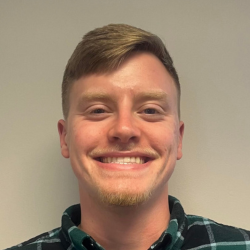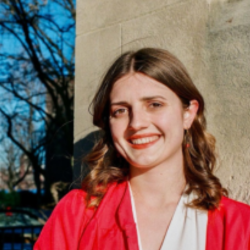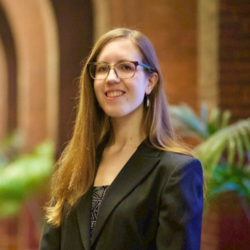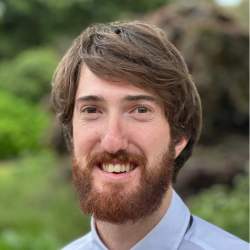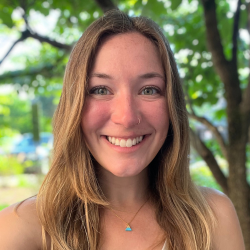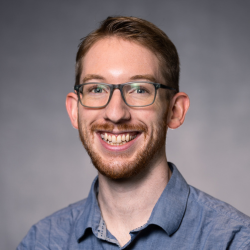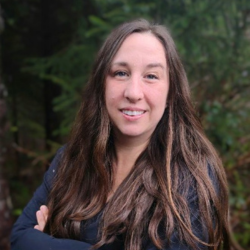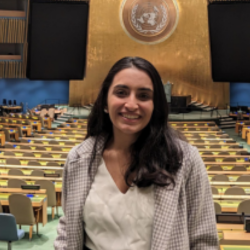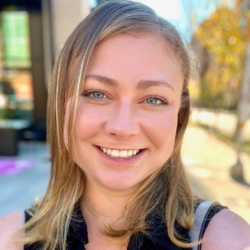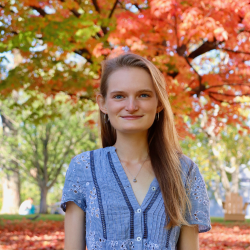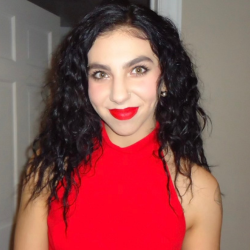12 early and transitioning-career scientists work to address environmental and ecological challenges
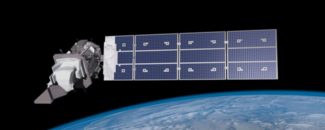
NCEI is proud to be entering their 10th year of partnership with the NASA DEVELOP Program! This unique internship opportunity allows early and transitioning-career scientists to get hands-on field experience using NASA Earth science satellite data in partnership with NCEI. The collaboration between NCEI and NASA DEVELOP offers invaluable experience and is a great opportunity for forming interpersonal relationships between organizations.
This spring, NASA DEVELOP is welcoming 12 interns who plan to divide their talents into three different user-driven projects. Working with NCEI, the interns will have access not only to data, but NCEI-based scientists as well. Since 2014, NCEI has had the pleasure of working alongside NASA DEVELOP and their interns to contribute positively to dozens of climate and conservation-related projects. Each team of early and transitioning-career scientists have contributed to efforts like urban tree recovery, early drought warning in the Midwest, water availability in the Sonoran Desert, and much more.
NCEI is proud to support NASA DEVELOP’s mission of “Cultivating Tomorrow’s Earth Observation Users” and we look forward to continuing working alongside each other to provide aspiring scientists the chance to work with real-world data and materials.
Spring 2024 Project Collaborations
This spring, the NASA DEVELOP and NCEI team will divide their talents into collaborating with several different environmental organizations across the western hemisphere. The Kentucky Climate Center and NOAA National Weather Service (Jackson and Paducah Forecast Offices), The Audubon Society of Rhode Island, the USDA Foreign Agricultural Service (FAS) International Production Assessment Division (IPAD), and the World Agricultural Outlook Board will be working with NASA DEVELOP interns to address environmental and ecological challenges using remote sensing data and scientific methods.
Kentucky Disasters Project Synopsis
In Kentucky, floods stand as the most prevalent natural disaster. In 2022, an extraordinary "1-in-1000-year" event led to historic flooding in eastern Kentucky, followed by another significant flood in western Kentucky in July 2023, with six to 12 inches of rain within 10 hours. Collaborating with the Kentucky Climate Center and NOAA National Weather Service offices, the NASA DEVELOP team will assess soil moisture conditions preceding both flood events and integrate environmental flood susceptibility data to generate a comprehensive flood risk map for Kentucky. These maps will aid the efforts of local agencies to bolster flood resilience statewide.
Rhode Island Ecological Conservation Project
The Audubon Society of Rhode Island (aka as Audubon or ASRI) is strategically integrating scientific methods into its conservation efforts, particularly focusing on avian species. Audubon collects baseline data on bird species-habitat associations and identifies "responsibility bird" species (RBS) for targeted monitoring and management. Currently, Audubon aims to develop monitoring strategies for nine RBS. NASA DEVELOP is supporting these efforts by incorporating remote sensing techniques using Landsat and Sentinel-2 satellite imagery to assess historical and future land cover changes, which will aid in prioritizing conservation efforts.
Northern Brazil Agriculture Project Synopsis
Brazil, ranked as the world's fourth-largest agricultural producer, faces fluctuations in crop yields due to climatic variability, notably influenced by the El-Niño-Southern Oscillation (ENSO). To evaluate ENSO's impact on Brazilian agriculture, the NASA DEVELOP team will collaborate with USDA's Foreign Agricultural Service (FAS) and the World Agricultural Outlook Board. Focusing on northern Brazil, prone to drier conditions during El Niño, the team will utilize Landsat Missions 5–9 data to create sub-state-level normalized difference vegetation index (NDVI) maps, complementing state-level crop yield data. Analysis of agricultural trends alongside precipitation and ENSO data aids in enhancing crop production outlooks for stakeholders.
Spring 2024 Interns
Kentucky Disaster Project Team Members
Jason Reynolds
Jason, originally from Bethpage, NY, moved to Indian Trail, NC. He swam competitively for 13 years and has always prioritized academics, attending Union County Early College. Jason graduated from the University of North Carolina at Chapel Hill in December 2023 with a Bachelor of Science in Environmental Science. Eager to apply his skills, he is excited to join the NASA DEVELOP Program for Spring 2024, aiming to enhance his analytical and interpersonal abilities while exploring professional opportunities. Passionate about weather, climate change, and health, Jason is looking forward to enjoying Asheville's parks and nature spots. In his leisure time, he walks his five dogs, spends time with family, and stays informed on political, health, and weather updates.
Jaydi Swanson
Jaydi Swanson, originally from southern Illinois, pursued her passion for marine science at Boston University, graduating with a BA in Marine Science and a minor in computer science in December 2022. Engaged in hands-on research at BU's Marine Program, she investigated carbon transport in the Plum Island Estuary during a university-funded project. Transitioning to Columbia, Missouri, she contributed to biology lab research on environmental impacts. Seeking communication-focused work, Jaydi became a first mate/naturalist at Nags Head Dolphin Watch in the Outer Banks, NC, fulfilling her childhood dream and engaging in community outreach. Excited to join NASA DEVELOP's Kentucky Disasters team, she aims to expand her skills and explore new areas while considering future Master’s programs. Outside work, Jaydi enjoys reading, writing, music, art, and being outdoors, anticipating returning to Boston to continue her journey of exploration and learning.
Claire Beezley
Claire grew up in New Jersey. An interest in international affairs led her to Washington, DC to study at Georgetown University’s School of Foreign Service. There she grew interested in environmental issues, climate change, and the Arctic, eventually pursuing a major in Science, Technology, and International Affairs with a concentration in Environment and Energy. She followed these interests outside the classroom through an internship at the Environmental Law Institute and as a participant in a Research Experiences for Undergraduates program studying methane emissions from Arctic lakes. Since graduating, she has assisted with research modeling global hydrofluorocarbon emissions. She also served as a fall crew member with the Montana Conservation Corps, where she helped maintain trails in northwest Montana. She is interested in remote sensing for its capacity to facilitate impactful research, and is thrilled to be improving her skills as a DEVELOP participant. In her free time, Claire enjoys hiking, biking, and playing the piano.
Daniel Feinberg
Daniel Feinberg, Project Lead of the Spring 2024 NASA DEVELOP program located in Asheville, NC, focuses on GIS to craft flood susceptibility, vulnerability, risk, and soil moisture maps for Kentucky. Raised in Santa Barbara, CA, he studied Environmental Policy, IS, and Economics at UC Davis. Post-graduation, he contributed to NDVI mapping, habitat programs, and watershed sciences, and has worked with the Los Padres Forest Association and the Colville National Forest. Subsequently, he served with GoodFarms before returning to the U.S. Forest Service in Montana. Daniel enjoys cooking and being outside in his free time, and eagerly anticipates his role with the Kentucky Disasters team, embracing future opportunities.
Rhode Island Ecological Conservation Project Team Members
Kristen Mecke
Kristen, from Warner Robins, GA, earned her BS in Biology from Middle Georgia State University in 2013 and an MS in Ecology from Missouri State University in 2016. She focused on anti-predatory behavior in the western cottonmouth. Discovering her love for fieldwork during graduate school, Kristen managed plant ecology labs at the University of Kansas and the University of Tennessee before starting her current job at the National Institute for Modeling Biological Systems. An outdoor enthusiast, she volunteers in Great Smoky Mountains NP for water quality sampling. Kristen enjoys teaching hot yoga, spending time with her family (including dog Fitz), backpacking, and hiking in the Smokies, where she's exploring all 900 miles of trails, currently at 54% completion. Join her for a hike if you're in the area!
Joseph Barnes
Joe, a native of Suffield, CT, discovered his passion for aquaculture in high school, which led to a double major in Biology and Aquaculture and Fishery Technology at the University of Rhode Island. After graduation in 2018, he conducted research on Eastern oysters and harmful algal blooms, later working as an environmental analyst and managing an indoor aquaculture farm. Engaging in AmeriCorps for a year, Joe coordinated youth education and community initiatives. He recently earned his Master's in Environmental Science from American University, focusing on freshwater biofilm and microplastics in the Potomac River. Currently, Joe conducts science outreach at a Washington D.C. science store and is developing geospatial research skills as a participant in the DEVELOP program. In his free time, he enjoys exploring trails, tending to houseplants, and reading the latest X-Men comics.
Natasha Crater
Natasha Crater is pursuing a Bachelor of Science in Natural Resources with a focus on Landscape Analysis and GIS through Oregon State University E-campus. Residing in rural southwest Washington with her husband and three children, she co-manages an environmental consulting business. Natasha's career journey includes contributing to a large-scale vegetation management project in the Willapa Bay estuary and working for the US Fish and Wildlife Service. In addition to her environmental pursuits, Natasha has studied English Writing Practices and Ethnic Studies at Humboldt State University. She has leveraged her writing skills as a freelance journalist and consultant since 2012. With a background in public administration, she has held various administrative roles in local government agencies and currently serves as a School Board Director, advocating for STEAM education and funding in her district. Natasha aims to complete her Bachelor of Arts alongside her Natural Resources degree by 2026.
Nancy Nthiga
Nancy, born and raised in Kenya, earned her undergraduate degree in Global Challenges from the African Leadership University in Rwanda in 2017. Currently pursuing her MS in Geography at Florida State University, she focuses on understanding terrestrial ecosystems' response to climate change and human activities like deforestation. Nancy specializes in geospatial technologies such as Remote Sensing and GIS to monitor ecosystem alterations. Her thesis examines deforestation trends in Sub-Saharan Africa, South East Asia, and Latin America using MODIS satellite data from 2002 to 2022. In 2017, Nancy established "She for Trees," a non-profit Agroforestry Initiative in Kenya. This initiative collaborates with female farmers, aiming to bolster the country's forest cover while ensuring their economic stability. Presently, this organization has a membership of 162 registered women who have collectively planted 15,830 trees. Recognized as one of the Top 100 Young African Conservation Leaders by WWF in 2021, she's committed to conservation efforts. Beyond academics, Nancy enjoys travel, disc golf, tennis, rock climbing, and hiking. Fluent in three languages and having lived in five countries, she eagerly anticipates participating in the NASA DEVELOP Program to enhance her Earth observation skills.
Northern Brazil Agriculture Project Team Members
Manpreet Kaur Singh
Manpreet, a Bay Area native now residing in Boston, is pursuing a Masters in Global Policy with a focus on Environmental Policy at Boston University (BU), following her undergraduate studies in Psychology and Cognitive Science at UC Davis. Her diverse research experience includes investigating autism development factors and mental health impacts on stress resilience in women. She interned at the International Rescue Committee, advocating for refugees and violence survivors, and later analyzed American media portrayals of the Middle Eastern/North African region in the 1940s. Her graduate studies sparked an interest in natural resource management and its intersection with human rights. As a Program Coordinator at BU's Institute Global for Sustainability, she oversees sustainability projects and leads efforts in water consumption assessment and mitigation. In her leisure time, Manpreet enjoys photography, fiction reading, and listening to music. Having been a barista for three years, she can make lattes and cappuccinos and embraces Boston’s snowy climate.
Devon Maloney
Devon, originally from Northern Virginia, spent her youth in Hawai‘i, Germany, and Belgium due to her family's Department of Defense assignments. She studied sustainable desert agriculture in southern Israel before earning her BSc in Physical Geography from the University of St. Andrews in Scotland, where she enjoyed exploring glaciated landscapes and hiking in the Highlands. Joining the Bee Lab at the University of Maryland, College Park after undergrad, she managed a national honey bee disease survey and mapped bee diseases. Now a PhD candidate at the University of North Carolina, Chapel Hill, Devon researches soil degradation and vegetation dynamics in West Africa, focusing on agricultural reclamation projects on desert borders. Her "critical remote sensing" approach analyzes satellite imagery to understand state power dynamics at borders such as US-Mexico, China-Kazakhstan, Israel-Gaza-Egypt, Turkey-Syria, and Egypt-Sudan. Devon aims to defend her dissertation this semester!
Grayson Shanley Barr
Grayson, originally from Princeton, NJ, spent much of her childhood in Indonesia and the Brazilian Amazon. She graduated from Middlebury College with a B.A. in Geography and Geology. While there, she researched human-environment relationships in the Congo Basin and co-authored a paper on forest engagement among migrant and indigenous households. Grayson also conducted fieldwork in Tanzania on landscape restoration projects. She aims to use remote sensing to study climate change's impact on agricultural production. An avid runner and thru-hiker, Grayson has trekked the John Muir Trail and the Tour du Mont Blanc. In her free time, she enjoys biking, reading, and vegetarian cooking. Grayson is excited to be part of DEVELOP this term, where she hopes to further her exploration of remote sensing and environmental issues in a collaborative setting.
Sofya Goncharenko
Sofya is originally from Cleveland, OH, but currently resides in Williamsburg, VA, to complete her bachelor’s degree in Neuroscience and Data Science at the College of William and Mary (WM). Sofya has worked for WM’s GIS Department as both a researcher and a teaching assistant. In her research, she focused on the relationships between foreign policy and environmental concerns using methods in remote sensing and GIS. Moreover, she assisted professors with introductory GIS classes to help her peers progress their proficiency in GIS software. Her interest in GIS was accidental and developed after a friend recommended a GIS class. After her first map, she was hooked, and the rest is history. Sofya intends to enroll in a graduate program centered on geodetic sciences and remote sensing in the fall of 2024. Meanwhile, Sofya engages in sports like boxing, ice skating, and cycling and has separately made a foray into the culinary world with the aim of continuing her passion and studying food science in her spare time.

